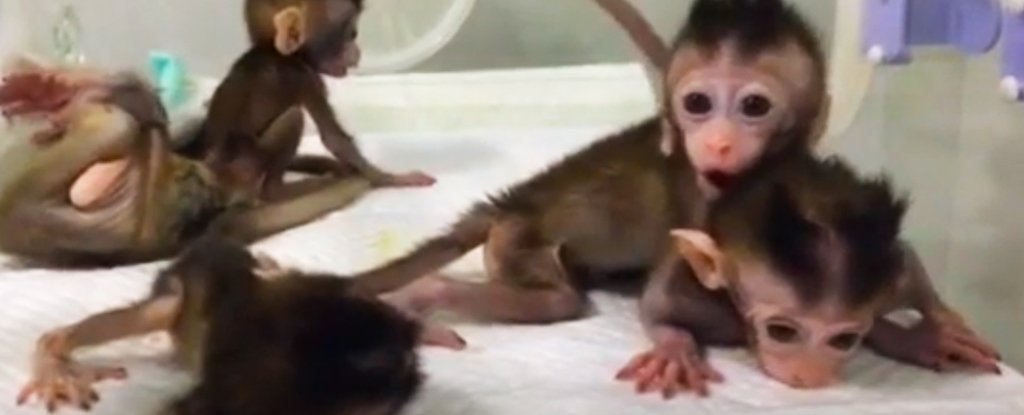
This time last year, the first primates cloned through a nucleus transfer technique made headlines around the world. Now, Chinese researchers have pushed the envelope even further – by breaking a regulatory gene in macaques before cloning them.
According to the researchers, cloning genetically altered primates has clear benefits for medical testing. But in the wake of controversy over gene-editing on humans, progress in this contentious area could be outpacing ethics.
After the new experiment, five infant macaques born at the Chinese Academy of Sciences' Institute of Neuroscience in Shanghai all share the exact same genes, derived from a fibroblast taken from the skin of a donor monkey.
More importantly, they all carry a copy of one specific gene – a version of BMAL1 that had been altered in the donor using CRISPR/Cas9 gene-editing technology.
This gene normally produces a regulatory protein that plays a role in managing certain biological rhythms in mammals. But in the altered version this protein isn't produced, leading animals to exhibit symptoms of circadian disorders, such as reduced sleep and greater movement at night.
They also show signs of anxiety and depression, along with schizophrenia-like behaviours.
"Disorder of circadian rhythm could lead to many human diseases, including sleep disorders, diabetic mellitus, cancer, and neurodegenerative diseases," says neuroscientist Hung-Chun Chang.
"Our BMAL1 knock-out monkeys thus could be used to study the disease pathogenesis as well as therapeutic treatments."
Using genetically altered animals to study illness is almost par-for-the-course in medical research today. Scientists regularly switch genes on and off in mice, flies, and fish to study their physiological effects.
Meanwhile, creating clones of transgenic models helps limit variables in experiments. Each animal is identical to the last, making it easier to notice subtle effects that otherwise could be missed.
Cloning transgenic primates hasn't been possible until recently, largely thanks to the way their genes lock down epigenetically when fertilised cells are faced with stress.
Last year, China's Institute of Neuroscience reported the successful reproduction of two long-tailed macaques using somatic cell nucleus transfer, the same process that produced the world-famous Dolly the Sheep in 1995.
For some, however, these scientific successes come at an unacceptable cost.
"Monkey after monkey was made to live in distressing conditions and then die after a few days," British journalist Chas Newkey-Burden wrote in The Independent last January.
"The PR people don't tell us the names of those babies."
This time, the team transferred 325 cloned embryos into 65 surrogate mothers, resulting in 16 pregnancies and five live births.
Whether the loss of life and potential for suffering and distress in the animal survivors is balanced by the opportunity to treat debilitating psychological disorders in humans is a complex question for ethicists.
Animal models don't necessarily translate into human biology as easily as we might expect, raising concerns that the results might not be worth the potential harm.
Yet the researchers counter that genetic engineering could actually be a solution to a bigger problem.
"This line of research will help to reduce the amount of macaque monkeys currently used in biomedical research around the world," says neuroscientist Mu-ming Poo, who contributed to both the editing of the original macaque and its cloning.
"Without the interference of genetic background, a much smaller number of cloned monkeys carrying disease phenotypes may be sufficient for pre-clinical tests of the efficacy of therapeutics."
Not everybody agrees. Deborah Cao from Griffith University in Australia is an expert on animal welfare, ethics, and law. She points out the lack of international guidelines for this kind of research.
"The best way to reduce the number of monkeys used in such experiments is to stop such animal experiments," Cao told Newsweek reporter, Hannah Osborne.
"Instead of developing nonhuman primate disease models for humans, they should develop human disease models for humans."
Right now, China is proving itself to be a controversial testing ground for the ethical limits of genetic engineering technology. Late last year, Chinese scientist He Jiankui sensationally announced the world's first genetically altered babies, following CRISPR editing.
He has since been accused of forging ethical approval, with rumours subsequently surfacing that he has been taken in by authorities.
Time will tell whether these five cloned macaques herald a new age in transgenic animal models, or represent an ethical line few will be keen to cross again any time soon.
This research was published in National Science Review, here and here.
https://www.sciencealert.com/chinese-scientists-have-cloned-a-genetically-altered-primate-for-the-first-timeBagikan Berita Ini














0 Response to "Chinese Scientists Have Cloned a Genetically Altered Primate For The First Time - ScienceAlert"
Post a Comment